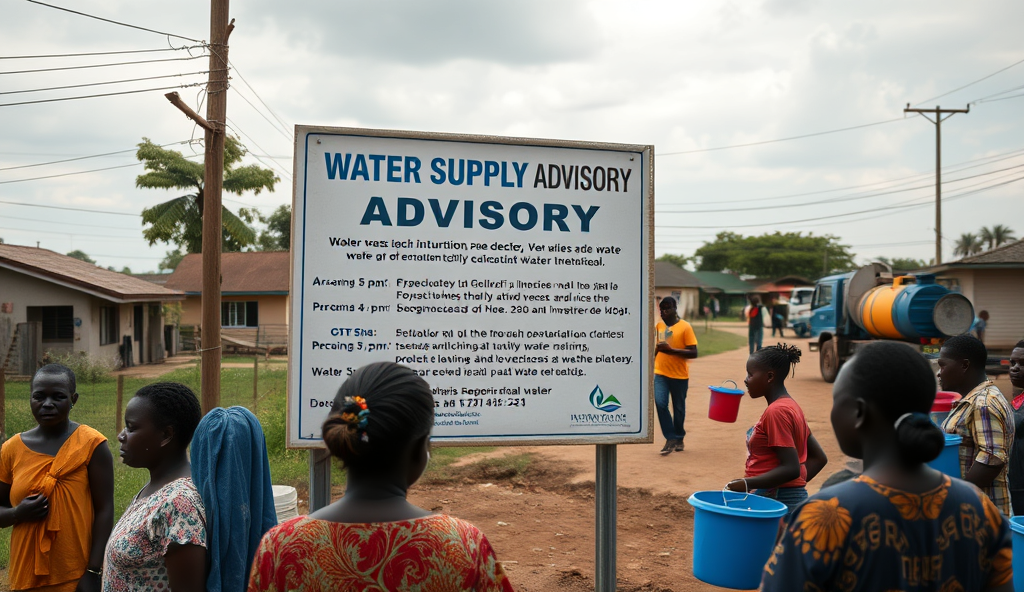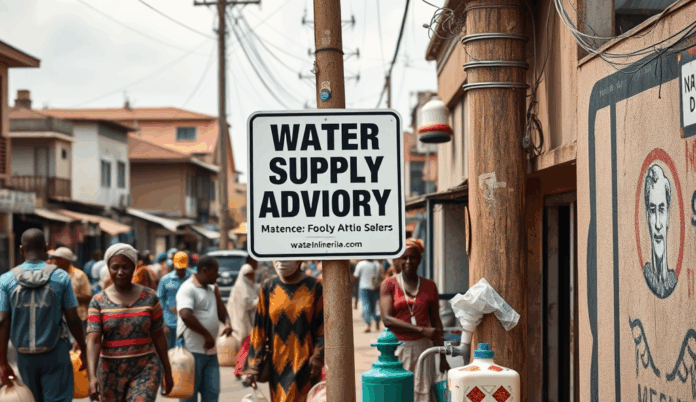Introduction to the current water supply situation in Wuse district Abuja
Residents of Wuse district continue to face inconsistent water supply, with many relying on alternative sources like boreholes and water tankers due to infrastructural challenges. A 2023 report by the Abuja Water Board indicates only 40% of households receive piped water regularly, forcing others to spend up to ₦5,000 weekly on supplemental supplies.
Recent water rationing schedules show Wuse Zone 5 experiences the most frequent interruptions, often lasting 3-4 days per week during peak demand periods. The FCT Water Board attributes these shortages to aging pipelines and increased population pressure, with demand exceeding supply by nearly 30% as of mid-2023.
These persistent issues highlight the need for infrastructure upgrades, which we’ll explore in the next section’s detailed analysis of Wuse’s water supply network. Meanwhile, residents remain advised to monitor official Wuse water supply updates for real-time rationing alerts.
Key Statistics

Overview of the water supply infrastructure in Wuse district
Residents of Wuse district continue to face inconsistent water supply with many relying on alternative sources like boreholes and water tankers due to infrastructural challenges.
Wuse’s water network relies on aging pipelines installed over two decades ago, with 60% of the infrastructure now exceeding its 20-year lifespan according to FCT Water Board 2023 maintenance reports. The district receives supply from the Lower Usuma Dam treatment plant through a distribution system plagued by frequent leaks, losing approximately 25% of treated water before reaching households.
Key pressure zones like Wuse Zone 5 face disproportionate shortages due to outdated booster stations unable to meet current demand, forcing residents to rely on water tankers and private boreholes. The Abuja Water Board acknowledges these systemic challenges in their 2024 infrastructure assessment, noting Wuse requires ₦2.8 billion in pipeline replacements to achieve consistent supply.
Upcoming sections will examine how these infrastructure limitations directly impact daily water availability across Wuse’s neighborhoods, with particular focus on recent rationing patterns. Meanwhile, residents can check the FCT Wuse water advisory portal for real-time updates on distribution schedules and outage notices.
Recent updates on water supply availability in Wuse district
Wuse's water network relies on aging pipelines installed over two decades ago with 60% of the infrastructure now exceeding its 20-year lifespan according to FCT Water Board 2023 maintenance reports.
The FCT Water Board’s March 2024 report shows Wuse currently receives 65% of its designed water capacity, with Zone 3 experiencing the most severe shortages at just 12 hours of weekly supply. Residents in high-density areas like Wuse Zone 6 now face extended rationing cycles of 72 hours between allocations, up from 48 hours in 2023 due to increased pipeline failures.
Recent infrastructure interventions include emergency repairs to the Zone 4 booster station in January 2024, which improved pressure for 15,000 households but failed to resolve systemic shortages. The Abuja Water Board’s weekly alerts indicate 22 major leaks were reported across Wuse in Q1 2024, predominantly in aging steel pipes near Wuse Market and Zone 2.
Water tanker deployments increased by 40% this dry season, with priority given to hospitals and schools under the FCT’s 2024 emergency response plan. These temporary measures precede the scheduled pipeline replacement project, which the water board confirms will commence in Q3 2024 across critical zones.
Common water supply challenges faced by residents in Wuse district
The FCT Water Board's March 2024 report shows Wuse currently receives 65% of its designed water capacity with Zone 3 experiencing the most severe shortages at just 12 hours of weekly supply.
Wuse residents grapple with inconsistent water access, particularly in high-density zones like Wuse Zone 6 where rationing cycles now stretch to 72 hours, forcing households to rely on expensive alternatives. The FCT Water Board’s March 2024 data reveals Zone 3 suffers the most acute shortages with only 12 hours of weekly supply, exacerbating hygiene challenges during peak demand periods.
Aging infrastructure remains a critical bottleneck, with 22 major leaks recorded in Q1 2024 across Wuse Market and Zone 2, where corroded steel pipes lose approximately 30% of transmitted water. These persistent leaks undermine temporary solutions like the 40% increase in water tanker deployments, leaving many residents dependent on unregulated vendors charging premium rates.
Pressure fluctuations from the partially repaired Zone 4 booster station create uneven distribution, with upper-floor apartments in buildings like Wuse Heights reporting complete dry spells for days. These systemic issues persist despite emergency measures, highlighting the urgency of the Q3 2024 pipeline replacement project announced by the Abuja Water Board.
Government and private sector interventions to improve water supply
The FCT Water Board accelerated its infrastructure upgrade plan in April 2024 allocating ₦850 million to replace corroded pipes in Wuse Zones 2-6 prioritizing leak-prone areas identified in Q1 reports.
The FCT Water Board accelerated its infrastructure upgrade plan in April 2024, allocating ₦850 million to replace corroded pipes in Wuse Zones 2-6, prioritizing leak-prone areas identified in Q1 reports. Private sector partners like Zenith Bank and MTN have funded 12 solar-powered boreholes across high-density zones, complementing the government’s tanker deployment strategy.
Under the Abuja Urban Water Sector Reform, the World Bank-funded NWRI project has trained 45 local technicians to maintain distribution systems, reducing repair response times from 72 to 48 hours since February 2024. These interventions align with the FCT’s 2024 water sustainability roadmap targeting 18-hour daily supply for Wuse by December.
Residents can track real-time updates through the Abuja Water Board’s newly launched SMS alert system (text “WUSE WATER” to 41919), while community water committees now monitor distribution in Zone 3 and Wuse Market. These coordinated efforts aim to stabilize supply before the next section’s water conservation strategies become necessary during prolonged shortages.
Tips for residents to manage water shortages effectively
Residents can access real-time Wuse water supply updates through multiple channels including the Abuja Water Board’s official Twitter handle (@AWB_FCT) and WhatsApp broadcast (add 09060005000).
With Wuse’s water infrastructure upgrades ongoing until December 2024, residents should adopt water-saving practices like fixing leaks promptly and using buckets instead of hosepipes for cleaning. The 12 new solar-powered boreholes in high-density areas can serve as alternative sources during scheduled maintenance or unexpected outages, especially in Zones 2-6 where pipe replacements are prioritized.
Storing water safely in covered containers prevents contamination during shortages, while the Abuja Water Board’s SMS alerts (text “WUSE WATER” to 41919) help plan usage around supply schedules. Community water committees in Zone 3 and Wuse Market also provide localized advice on rationing during peak demand periods from May to August.
For prolonged shortages, coordinate with neighbors to share tanker deliveries from FCT-approved vendors, whose locations are updated weekly through the water board’s notifications. These measures complement the upcoming section’s guidance on staying informed about real-time Wuse water supply updates through official channels.
How to stay informed about water supply updates in Wuse district
Residents can access real-time Wuse water supply updates through multiple channels, including the Abuja Water Board’s official Twitter handle (@AWB_FCT) and WhatsApp broadcast (add 09060005000), which provide daily alerts on rationing schedules and maintenance disruptions. The SMS service (text “WUSE WATER” to 41919) remains the most reliable for localized updates, especially for Zone 3-6 residents affected by ongoing pipe replacements.
For community-specific advisories, the Wuse Market water committee holds biweekly meetings (every 1st and 3rd Wednesday) to share FCT-approved tanker routes and solar-powered borehole availability in high-density areas. The FCT Water Department’s website (www.fctwaterboard.ng) also publishes weekly zone-by-zone supply timetables, last updated in March 2024 with projected outage durations.
During peak shortage periods (May-August), follow verified neighborhood WhatsApp groups like “Wuse Water Watch” for crowd-sourced updates on tanker deliveries and alternative sources. These platforms complement the infrastructure upgrades discussed earlier, ensuring residents adapt seamlessly to temporary disruptions while awaiting December 2024 project completion.
Conclusion and final thoughts on the water supply situation in Wuse district
The water supply challenges in Wuse district remain a pressing issue, with recent reports from the Abuja Water Board indicating only 60% coverage in 2023, leaving many residents dependent on tankers or boreholes. While infrastructure upgrades are underway, including pipeline expansions in Wuse Zone 5, intermittent shortages persist due to aging systems and growing demand.
Residents should stay informed through official Wuse water supply updates from the FCT Water Board, particularly regarding rationing schedules affecting areas like Wuse II and Zone 3. Community water committees have proven effective in coordinating tanker distributions during shortages, offering a temporary solution while long-term fixes progress.
Looking ahead, the planned Lower Usuma Dam rehabilitation promises improved supply, but until completion, conservation and alternative sources remain essential for Wuse households. Proactive engagement with local authorities can help residents navigate the current water advisory while awaiting systemic improvements.
Frequently Asked Questions
How can I check real-time water supply updates for my specific zone in Wuse?
Text 'WUSE WATER' to 41919 for SMS alerts or follow @AWB_FCT on Twitter for daily rationing schedules affecting your area.
What should I do during prolonged water shortages in Wuse Zone 5?
Coordinate with neighbors to share FCT-approved tanker deliveries and use the 12 solar-powered boreholes installed across high-density zones.
Are there community meetings to address water issues in Wuse Market area?
Join the Wuse Market water committee meetings every 1st and 3rd Wednesday for localized advisories and tanker route updates.
How can I report a major pipe leak in my Wuse neighborhood?
Contact the Abuja Water Board's 24-hour hotline at 09060005000 or use their WhatsApp service for faster response to infrastructure failures.
When will the pipeline replacement project begin in Wuse Zone 6?
The ₦850 million pipe replacement starts Q3 2024; monitor www.fctwaterboard.ng for weekly zone-specific timetables and outage durations.


